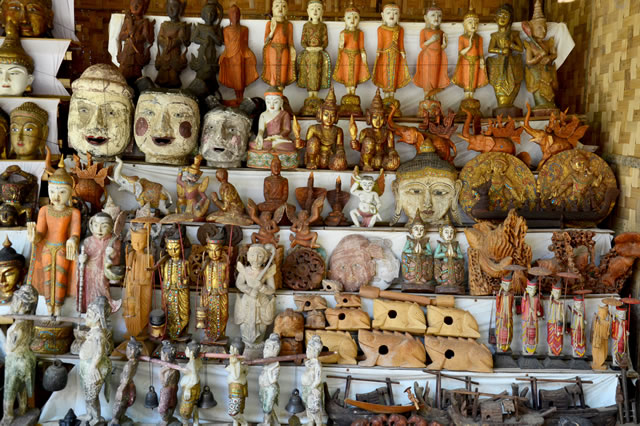Tourism in Myanmar Needs More Local Involvement

"If tourism growth is to be sustainable, we need more coordination between local authorities, business and communities, and increased local participation in tourism-related decisions and the tourist economy."
This was the main conclusion of a multistakeholder workshop on Responsible Tourism and Human Rights in Myanmar held in Naypyidaw from 30 September to 2 October by Myanmar Centre for Responsible Business and Hanns Seidel Foundation.
The workshop was attended by over 100 participants from government, Myanmar tourism companies and business associations, and civil society groups focussed on issues such as land rights and culture and environment protection, as well as international NGOs and tourism specialists.
Conference participants were asked to identify their top concerns about the development of tourism in Myanmar. The issue at the top of the list for over 20% of participants was lack of local participation in planning at tourism destinations. Other Top Five concerns were waste and water management, safety, access to land and relocation of communities, and tourism’s impact on children.
The workshop provided an opportunity to review progress on elements of the Myanmar government’s 2013 Tourism Master Plan relating to integrated planning and zoning, as well as the Responsible Tourism Policy (2012) and Community Involved Tourism Policy (2013), both of which were developed with the support of Hanns Seidel Foundation (HSF). In his opening address, Minister of Hotels and Tourism HE U Htay Aung how these policies, adopted as part of Myanmar’s reforms, have established the basis for further action.
However many participants noted that while the policies set a strong framework for the involvement of local communities in tourism, in practice this is not taking place on the ground, mainly due to the lack of capacity, money and time needed to achieve effective participatory decision-making. The need for more financial and technical support from donors was highlighted, along with political will.
MCRB presented some preliminary findings from their review of ‘hotel zones’ in Tada Oo, Inle and Bagan. Land and crop compensation in Tada Oo and Inle had led to local conflict, lack of trust, and resentment over land speculation; the Inle Lake Zone was also criticised by visitors and locals for its effects on the landscape and environment. In Bagan the main issues raised by stakeholders were not compensation and livelihoods, but the legality of hotels in culturally protected areas, and the need for consistent and transparent decision-making. Tourism Transparency’s presentation highlighted threats to communities and the environment in Inle as well as emerging destinations including Natmataung and Indawgyi.
The workshop heard some positive developments in the area of community involvement in tourism (CIT). In Kayah State, the International Trade Centre (ITC) was supporting villages to develop culture and nature tours, and had learned from study tours to established CIT projects in Thailand. In Thandaung-gyi, and Pakokku district, communities supported by Peace Nexus and Action Aid respectively, had recently received the green light to operate B’n’B accommodation to enable longer stays by tourists and more economic benefits to communities.
The workshop was also an opportunity to consider tourism from a human rights perspective. MCRB presented the positive and negative impacts of tourism on human rights which were identified in MCRB’s February 2015 Sector-Wide Impact Assessment (SWIA) on Tourism. Participants heard from Matthias Leisinger of Switzerland-based Kuoni Travel about how his company addresses human rights in its operations. Matthias also talked about Kuoni’s membership of a multistakeholder initiative in Europe known as the Roundtable: Human Rights and Tourism. Participants discussed how tourism stakeholders in Myanmar could work together to address specific human rights issues such as tourism impacts on children, or worker and tourist safety.
Another angle discussed in depth was how tourism could simultaneously draw on and support the conservation of Myanmar’s cultural and natural heritage. In addition to CIT projects in new destinations, the workshop also heard from the Ministry of Culture about the development of the Pyu World Heritage Sites including Sri Ksetra as destinations for foreign and local visitors. The workshop held an in-depth discussion between business, government and civil society on the challenges of developing Bagan to be both Myanmar’s premier tourism destination and a potential World Heritage Site. Participants heard from Professor Walter Jamieson of Thammasat University on the lessons to be learned from World Heritage Sites in Laos and Thailand.
Vicky Bowman, Director of Myanmar Centre for Responsible Business commented:
"This meeting highlighted how transparency, constant communication and the sharing of lessons learned and different perspectives facilitates better decisions on how to develop tourism sustainably. The recent history of ‘hotel zones’ in Myanmar shows how quick decisions taken without a full understanding of the potential social, environmental and cultural impacts, as well as the needs of the market, and local concerns, can lead to bad outcomes for communities, economic losses for business, environmental degradation and unhappy tourists."
Achim Munz, Resident Representative Hanns Seidel Foundation Myanmar, said:
"This Naypyidaw workshop demonstrated the need for local level multistakeholder discussions on how tourism is developing in Myanmar’s established and emerging destinations. In 2016, Hanns Seidel Foundation plans to facilitate such discussions in partnership with others, focusing on some of the key issues raised in this week’s meeting, such as zoning and managing environmental impacts to ensure that tourism is the flame that heats the rice pot, not the fire that burns the house down."
အထက်ပါအကြောင်းအရာနှင့်ပတ်သတ်၍ ဆက်လက်ဖတ်ရှုလိုပါက
- ခရီးသွားလာရေးလုပ်ငန်း
- စာတမ်းအသစ်နှင့် မကြာမီတွင် ကျင်းပပြုလုပ်မည့် ခရီးသွားလုပ်ငန်းကဏ္ဍ၏ လူ့အခွင့်အရေးဆိုင်ရာ အွန်လိုင်းဆွေးနွေးပွဲ
- မြန်မာ့ခရီးသွားလုပ်ငန်းကဏ္ဍအတွက် အဆိုပြုလွှာအသစ်
- Planning for a Brighter Future in Mrauk U: Cultural Heritage and Tourism Management
- 4th National Conference on Communities and Tourism 2019
 English
English မြန်မာ
မြန်မာ မြန်မာ (unicode)
မြန်မာ (unicode)








